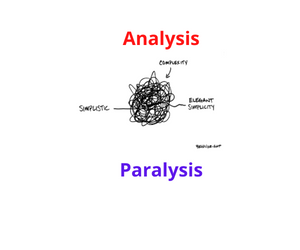“Reassuringly Boring.” That is a good day at the office for an Operations professional. The operative word here is “reassuringly”; in Operations when the days starts, you ought to have an idea of what to expect that day and as an Operations professional, you would like it to work out that way. This is not an anti-change credo, although I have met plenty of folk in Operations who are not good at change; it is about professional pride. Once you have set-up your shop, you want it to run as planned. Imagine if you were the “Fat Controller of the Swiss Railway timetable”; a good day at the office would be when everything runs “..akkording to ze plan, ja.” Operations in a bank should be no different.
So thought #1: “Reassuringly Boring is the order of the day.” I’ll call it “Nick & Alan’s regular Ops day law”, in honour of two great friends; Nick Orchard, my partner-in-crime for a number of years at Credit Suisse where we set up the CLS business for FX settlement internally and did a lot of work with the industry to get CLS up and running. Alan Butterworth was our Relationship Manager at CLS. He helped us and all the German speaking banks get up and running in CLS. We had a pretty special relationship and spent a lot of time with one another; CLS like all new businesses had its teething problems and like most new businesses, things settled down. It was at that stage that my two good friends coined this phrase. We did not realise at the time that actually this was an important thing to be able to say about Operations generally.
“There is nothing special about Investment Banking.” My first job in banking was with Salomon Brothers, which is now part of Citigroup. To get the job, on their graduate programme, I had to pass an interview with a gentleman called Lynn Dukes, their Head of European Operations. I met him in the Salomon glass palace atop Victoria Station. At the time, just after Big Bang, in mid 1987, this was “the trading floor”; as big as two football pitches. An American import on a Chevy Suburban scale. Lynn was almost the anti-thesis of the City gent. Bearded, shirt collar open, tie askance, sleeves rolled up and feet on the desk in his glass backed office overlooking this great trading floor. He told me had 30 minutes and was then off to the airport again. I would be the first person explicitly hired as a graduate into this BOOT programme that was run out of New York. We chatted, amiably enough and then he asked me what I thought about working really long hours and weekends. Now bear in mind that my work experience was somewhat limited and my knowledge of Operations was limited to what I had gleaned from one of his managers. I had not seen this question coming, so I am sure more out of naivety than from any profound strategical thinking I said: “Look, I don’t know anything about this business and I am sure there might be reasons why sometimes, long hours and weekends are needed, but quite frankly it looks to me that it is a business like any other and if you are not able to run it between 8am and 6pm, then you are probably doing something wrong!” We chatted a bit more, using up the allotted 30 minutes.
“Please call us next Tuesday to find out if you have been selected”, I was told. I actually got the job and started immediately after graduation.
After I had been there a few weeks, Lynn Dukes pulled me aside. “Really good to have you here. Glad you accepted. by the way, great answer to the question about the long hours. All the Americans answer that totally differently, telling me they’ll work 25 hours a day and 8 days a week.” Seems my answer to the interview question was more intelligent than naive, but I would have to put that down as much to luck as judgement. Over the years though, I can look back and now think there was a certain soupçon of prescience in that remark. Of course in the interim all things banking are more global and there is a lot more shift work. Fundamentally though, the point is that you ought to be able to get thru the workload in the time available. “Tagfertig” as my Swiss friends would call it. With that end in mind, an Operations manager needs to balance Control, Capacity and Cost to achieve that. If the only dimension being managed is Cost, as it is in many shops at the end of 2012, then you cannot ensure Control and Capacity.
“Procedures matter.” When things go wrong in any production environment, the cause can almost without exception be attributed to one of two situations. Either “Inadequate procedure” or “Adequate procedure not followed”. As a McKinsey trained mind would say these two are MECE: mutually exclusive and collectively exhaustive. In simple layman’s terms, for the not trained by McKinsey mind: there are only two options and it has to be one or the other. If you have good procedures, that means they are good for both the expected and the abnormal. It is fair to expect that you can deal with “known unknowns”, as in “it is to be expected that payments systems crash, most likely on Monday mornings, so we must have a Plan B, and a Plan C, for that matter to execute time critical payments even if Plan A does not work. This is the very reason all banks do a lot of BCP work.
If you have a procedure, then you should be in the habit of following it. But. this is not an excuse to simply be a jobsworth and only do what is written. At any given time, you as an Operations professional should have an opinion about the state of your procedures. Are they as accurate, complete and up to date as can be? If they are, great, follow them. If they are not, change them.
This is the third and final thought for this week’s Blog post: “Procedures are essential. Have them and follow them. If they are wrong, change them”. I’ll call this “Sammons’ Law” in honour of Mike Sammons, a fellow Goldman alum, who deserves full credit for sowing the seeds of this observation. In our earliest days at Goldman Sachs, the procedure was something Mike brought up time and again. Whilst our business is somewhat more complex than in those Goldman days, with Swaps, clearing and many new products to deal with, the basic principals are still the same.
Lessons Learned: As our McKinsey friends preach, we can always break things down into threes. This week’s three need to be the essential tenets of the Operations manager’s mindset.
A personal request: Comments and feedback from regular readers are very welcome. Thank you for each and every one of them. If you find this Blog useful, please subscribe. There is an E-Mail tool and an RSS link on the right hand side of the main Blog page. If you like it enough to share, please share this with a friend or two and ask them to subscribe too. If I am wide of the mark and not offering anything of use, please comment or contact me directly via E-Mail.
Share on:



